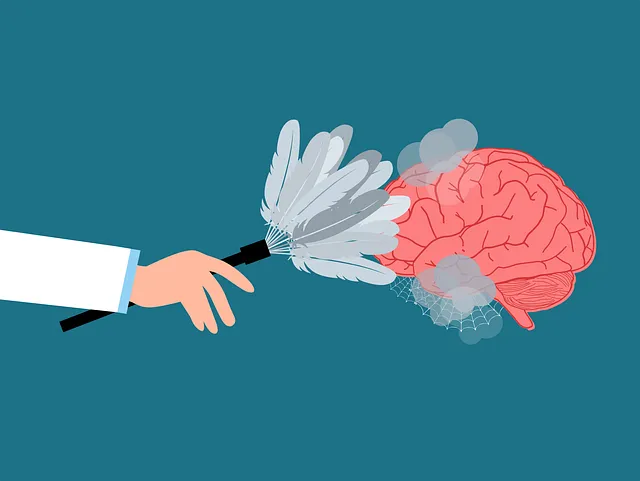Cultural competency in healthcare, crucial at institutions like the Kaiser Permanente behavioral health center Denver, significantly impacts patient outcomes and provider well-being by understanding diverse cultural backgrounds. In a diverse society like the US, this fosters better communication, builds trust, and improves patient satisfaction, particularly in mental health settings. The Kaiser Permanente Denver facility is renowned for its culturally competent approach, offering tailored care through innovative training and community outreach programs. Effective training should focus on mental wellness and self-esteem improvement, using interactive workshops, case studies, role-playing, and journaling exercises. Measuring and sustaining cultural competency involves pre- and post-training assessments, focus groups, and policy implementation by the Mental Health Policy Analysis team, ultimately improving outcomes like Anxiety Relief for all patients.
“Cultural competency training within healthcare is essential for delivering quality, equitable care. This article explores why such training is critical, using Kaiser Permanente Behavioral Health Center Denver as a case study—a leading organization in this domain. We’ll delve into the key components of effective training programs and strategies to measure and sustain cultural competency post-training. By understanding these aspects, healthcare providers can better navigate diverse patient populations.”
- Understanding Cultural Competency in Healthcare: Why It Matters
- Kaiser Permanente Behavioral Health Center Denver: A Leading Example
- Components of Effective Training Programs
- Measuring and Sustaining Cultural Competency Post-Training
Understanding Cultural Competency in Healthcare: Why It Matters

Cultural competency in healthcare is an essential aspect that often gets overlooked but significantly impacts patient outcomes and provider well-being. It refers to the ability of healthcare professionals to understand, appreciate, and respect diverse cultural backgrounds, beliefs, and values while delivering quality care. In a diverse society like the United States, where patients come from various ethnic, racial, and socioeconomic groups, including those at Kaiser Permanente behavioral health center Denver, this competency is crucial.
When healthcare providers demonstrate cultural sensitivity and competence, it fosters better communication, builds trust, and improves patient satisfaction. This is particularly important in mental health settings, as it can help address cultural barriers to care, enhance treatment adherence, and ultimately improve outcomes for marginalized communities. By integrating cultural competency training, such as social skills training and self-care practices, burnout prevention strategies for healthcare providers can be effectively implemented, leading to a healthier and more supportive work environment.
Kaiser Permanente Behavioral Health Center Denver: A Leading Example

The Kaiser Permanente Behavioral Health Center Denver stands as a shining example of comprehensive healthcare delivery with a strong emphasis on cultural competency. This leading facility prioritizes addressing the unique needs of diverse communities, recognizing that effective treatment requires an understanding of cultural backgrounds and mental health practices specific to various populations. By integrating innovative training programs, they equip their staff with the skills to deliver compassionate care tailored to individual and community contexts.
Through its dedicated initiatives, the center promotes emotional well-being by teaching evidence-based stress management techniques adapted for different cultural settings. Furthermore, they actively engage in community outreach program implementations, fostering connections that bridge healthcare gaps. These efforts not only enhance access to mental health services but also cultivate a deeper understanding of the diverse communities they serve, ensuring every individual receives respectful and culturally sensitive care.
Components of Effective Training Programs

Effective cultural competency training programs for healthcare providers should encompass several key components to ensure maximum impact and positive outcomes. One of the primary foci should be on mental wellness and self-esteem improvement, as these aspects are deeply intertwined with cultural sensitivity. Training should include interactive workshops, case studies, and role-playing scenarios that challenge biases and promote empathy. For instance, a Kaiser Permanente behavioral health center in Denver might offer workshops that delve into the impact of systemic racism on mental health, or sessions that guide providers through mental wellness journaling exercises to reflect on their own cultural beliefs and how they influence patient interactions.
Additionally, programs should facilitate open dialogue and active listening skills, encouraging healthcare professionals to actively engage with patients from diverse backgrounds. This involves learning about different communication styles, cultural norms, and values, as well as understanding the historical and societal factors that shape individuals’ health experiences. Incorporating mental wellness journal prompts can aid in this process by providing structured opportunities for self-reflection, helping providers recognize their own biases and develop strategies to deliver more culturally competent care.
Measuring and Sustaining Cultural Competency Post-Training

Measuring cultural competency is crucial to ensure that training programs like those at the Kaiser Permanente behavioral health center in Denver effectively translate into improved patient care. It involves assessing both knowledge and attitudes, as well as observable behaviors. The Mind Over Matter Principles can guide this evaluation by offering a framework for understanding mental health challenges from diverse cultural perspectives. Through pre- and post-training assessments, participants’ knowledge of cultural competencies can be gauged, highlighting areas that need reinforcement. Additionally, gathering feedback through focus groups or surveys allows for insights into how training has influenced attitudes and behaviors in interacting with patients from different backgrounds.
Sustaining cultural competency requires ongoing practice and institutional support. The Mental Health Policy Analysis and Advocacy team at Kaiser Permanente Denver can play a vital role by promoting the integration of cultural competency into routine clinical practices. This might involve implementing policies that encourage culturally responsive care, providing regular refresher training sessions, and fostering an environment where open discussions about cultural differences are encouraged. By doing so, healthcare providers can continually enhance their skills, ensuring that every patient receives care tailored to their unique cultural needs, thereby improving overall mental health outcomes, including Anxiety Relief.
Healthcare provider cultural competency training, as demonstrated by the successful programs at the Kaiser Permanente Behavioral Health Center in Denver, is a vital step towards providing inclusive and effective care. By understanding diverse cultural contexts and implementing tailored strategies, healthcare organizations can significantly improve patient outcomes and build stronger, more compassionate communities. Effective training programs, coupled with ongoing measurement and sustenance efforts, ensure that cultural competency remains an integral part of the healthcare landscape, reflecting the diverse populations we serve.






